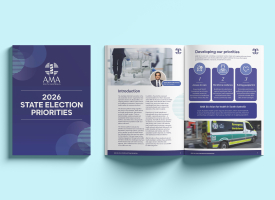What makes specialist doctor trainees happy? New study reveals top factors for job satisfaction
A large Australian study has revealed the top factors for specialist doctor trainee satisfaction.
Research from the Melbourne Institute Medicine in Australia: Balancing Employment and Life (MABEL) indicates that good clinical supervision and support, appropriate working hours, and supported study time directly affect trainees’ satisfaction, potentially affecting their quality of clinical care.
AMA President, Dr Tony Bartone, said that ensuring doctors have access to uninterrupted clinical support time (CST) is central to providing safer, more efficient service delivery and patient care.
“But feedback from hospitals suggests that many doctors currently undertake clinical support roles and activities in their own time, regardless of CST being allocated and without which hospitals would grind to a halt,” Dr Bartone said.
“Governments have a key role to play in ensuring that a paid, protected allocation to CST is adequately financed and supported in public hospitals.
“They must also ensure that access to CST is monitored and linked to performance measures that serve to enhance quality, safety, and accountability.”
The AMA is calling on the Council of Australian Governments (COAG) to review the National Safety and Quality Health Service Standards to ensure provisions exist to measure the performance of the health system in relation to quality of clinical training and access to protected clinical support time.
The AMA recently released its Position Statement on Clinical Support Time for Public Hospital Doctors 2019, an updated revision of the 2010 Position Statement.
The AMA Position Statement on Clinical Support Time for Public Hospital Doctors 2019 is at https://ama.com.au/position-statement/clinical-support-time-public-hospital-doctors-2010-revised-2019
The MABEL research is at https://onlinelibrary.wiley.com/doi/pdf/10.1111/medu.14041



